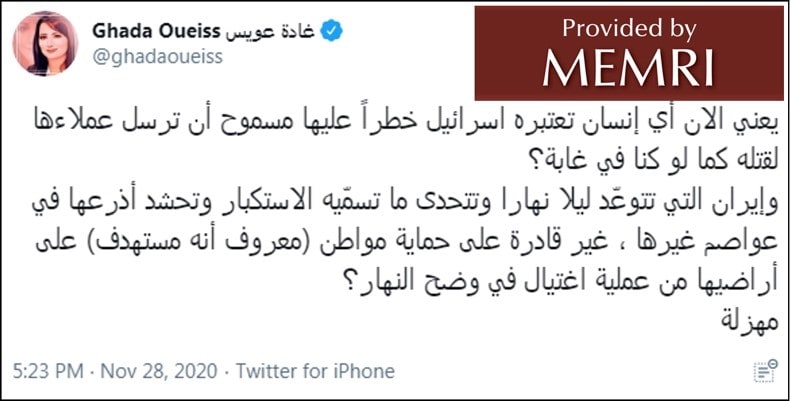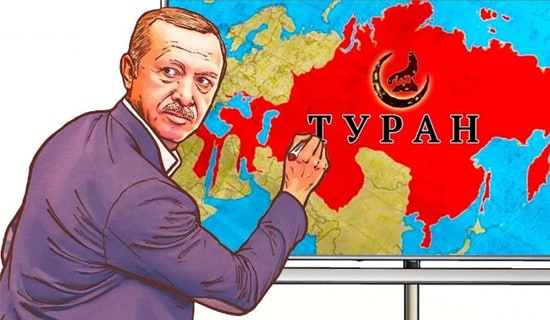Qatari media published many reactions to the November 27, 2020 assassination of Mohsen Fakhrizadeh, Iran's top nuclear scientist and the father of the Iranian nuclear program. The Qatari foreign minister condemned the assassination and extended his condolences to the Iranian government and people, and condemnation was also expressed in editorials in Qatari dailies. Qatari media figures likewise condemned it and also pointed an accusing finger at Israel, even raising the possibility that Saudi Arabia and the UAE had been involved in the operation.
It should be noted that recently Qatar and Iran have been emphasizing the close relations among these three countries. A November 24 Qatar-Iran economic cooperation conference in Isfahan, Iran discussed the subject at length. The following day, Qatari Emir Sheikh Tamim bin Hamad Al-Thani, in a phone conversation, invited Iranian President Hassan Rouhani to visit the Qatari capital Doha, telling him that Qatar-Iran relations were "strategic" and that Qatar would make a great effort to implement the agreements signed between the two countries and to promote Qatar-Iran cooperation in all areas. He added that Iran must be part of any dialogue aimed at reaching an agreement assuring the security of the region, and expressed hope that the talks between Iran and the Gulf states would be renewed now that Joe Biden had won the U.S. presidential election.[1]
The following is a review of reactions in the Qatari government and media to Mohsen Fakhrizadeh's assassination.
Qatari Foreign Minister: Qatar Harshly Condemns The Assassination Of Fakhrizadeh And Sends Condolences To Iran
Qatari Foreign Minister and Deputy Prime Minister Sheikh Mohammed bin Abdulrahman Al-Thani spoke to Iranian Foreign Minister Javad Zarif on the telephone, saying: "Qatar harshly condemns the explosion which took place in Teheran and the assassination of the scientist Mohsen Fakhrizadeh, who established the Organization of Defensive Innovation and Research at the Iranian Defense Ministry and was its president, during an armed attack," and adding that the incident was a clear violation of human rights. He extended Qatar's condolences to the government and the people of the Islamic Republic of Iran and stressed that "such actions only add fuel to the fire at a time when the region and the international community are seeking ways to reduce the tension and return to the negotiating table and to diplomacy." He also urged "restraint and the investment of efforts to find deep-rooted solutions to the unsolved problems." For his part, Iranian Foreign Minister Zarif expressed appreciation for Qatar's stand and emphasized the close ties between the two countries.[2]
Qatari Editorials: This Despicable Operation Damages Efforts At Dialogue With Iran
The November 29 editorial in the Qatari state-run daily Al-Raya emphasized that Qatar condemns the assassination, that Iran is a neighboring country, and that any differences with Iran must be resolved only through constructive dialogue and negotiations. It stated: "The harsh condemnation expressed in yesterday's phone call by the [Qatari] deputy prime minister and foreign minister to Iran's foreign minister – in which he harshly condemned, on behalf of Qatar, the Tehran blast and the assassination of scientist Mohsen Fakhrizadeh, director of the Iranian Defense Ministry's Research and Innovation Organization... and called the [assassination] a clear violation of human rights – was based on Qatar's immutable stance opposing all terrorism and violence of any kind and from any source... Qatar's opposition to assassinations and terrorism are clear and unchanging. It has [always] opposed violence and terrorism, no matter the motives or reasons, and its opposition to the assassination operation against the Iranian nuclear scientist stems from this position. It views this operation as harmful to the efforts to maintain a dialogue with Iran about its nuclear issue. This is also the reason for the international opposition and condemnation of the incident, as it is a dangerous act of escalation which may yield disastrous results.
"It is vital that everyone act with restraint, and refrain from any action that could escalate the tensions in the region – which will serve no one and will even derail the talks on Iran's nuclear project. Everyone must understand that the world is unwilling to enter into any escalation that could harm the region as well as the global economy and global stability. This is the basis for Qatar's position condemning the incident and viewing it as an unacceptable act which only adds fuel to the fire...
"The perpetrators of the blast and the assassination of the Iranian nuclear scientist obviously do not want the region to be stable[;] with this operation, they are only further fanning the flames in order to bring about a return of a state of war, which will harm everyone – not just Iran, but the entire world. Therefore, what is required is restraint, as well as regional and international action to ameliorate the danger of a war which no one wants. The Qatari position stems from the fact that Iran is a neighbor of the Gulf region, and that even if there are political or security disagreements between [Iran] and some of the countries of the world, these must be examined constructively, via dialogue and negotiation, in order to resolve them, instead of assassinating Iranian officials, which could bring everyone back to a state of war, causing instability in the region."[3]
Similar statements were made by the Qatari daily Al-Sharq in its November 29 editorial: "The [November 27] explosions that took place in Somalia [i.e. the suicide bombing in Mogadishu] and in Iran are absolutely despicable. The former caused the death and wounding of [a number of] people, and the second caused the assassination of the scientist Mohsen Fakhrizadeh, head of the Iranian Defense Ministry's research and development division. The armed attack in Tehran constitutes a human rights violation that could add fuel to the fire, at a time when the region and the international community are seeking other means of alleviating the tensions and returning to the negotiating table and to diplomacy. Restraint is essential, as is aspiring to find fundamental solutions for issues that are unresolved. Diplomacy is the best solution for preventing the assassination operation from creating a new crisis..."[4]
Al-Jazeera – The Mouthpiece For Iranian Threats Following The Assassination
The Qatari Al-Jazeera TV tweeted extensively about Iran's threats of revenge for the assassination. For example, on November 27, the day of the attack, it tweeted: "Iranian Majlis Speaker: Our revenge will include all those who carried out the assassination of Mohsen Fakhrizadeh as well as whoever was behind it."[5] The next day, it tweeted: "[Iranian President] Rouhani: All our enemies must understand that the crime of the assassination of Fakhrizadeh will not remain unavenged and the response will come at the appropriate time."[6] It is noteworthy that several Al-Jazeera journalists, among them Meriem Belalia and Osman Ayfarah, retweeted these tweets.
Pointing The Finger At Israel
Qatari media figures accused Israel in the assassination, condemning it. Al-Jazeera presenter Ghada Oueiss tweeted an image of an illuminated Ten Commandments in Hebrew and added: "Oh Israel, thou shalt not murder – [From] the Ten Commandments![7]

Oueiss also tweeted: "In other words, now Israel is permitted to send its agents to murder anyone it views as a danger to itself, as if we live in the jungle? While Iran – which issues threats day and night, challenges what it refers to as 'the arrogance' [i.e. the U.S.] and recruits its proxies in the capitals of other countries – cannot defend [one of its own] citizens on its own soil, when he is a known to be a target, against an assassination operation in broad daylight? Absurd."[8] This tweet was retweeted by Wajd Waqfi, another Al-Jazeera.

Leading Al-Jazeera presenter Jalal Chahda tweeted: "Israeli Prime Minister Netanyahu, in a 2018 review of what he calls 'Iran's ballistic and nuclear capabilities,' asked those present to remember the name of the Iranian nuclear scientist Fakhrizadeh." The tweet included a video of Netanyahu's statements.[9]

Another Al-Jazeera presenter, Faisal Al-Kasim, tweeted on the day of the assassination: "Assassination of top Iranian nuclear scientist Mohsen [Fakrih]zadeh in the heart of Tehran – Do you think Israel did it?"[10]

Azmi Bishara,[11] advisor to the Qatari emir and director of the Arab Center for Research and Policy Studies in Doha, tweeted: "Even those who disagree with Iran's regional policy can understand that Israel's freedom to kill whomever it wishes to, wherever it wants to, with no oversight and with impunity, and no international condemnation... as if it were the only policeman in the region and the only one with nuclear weapons – this is something for which the entire region is likely to pay the price."[12]

Allegations Of Saudi, UAE Involvement In Assassination
On November 28, 2020, Qatari media figure Jaber Al-Harmi implied that the Saudis were involved in the incident: "The timing of the assassination of the Iranian nuclear scientist Mohsen Fakrizadeh is no coincidence. [The assassination] occurred following Israeli declarations and leaks about a meeting which took place between [Saudi Crown Prince] Mohammed bin Salman and Netanyahu. This suggests that there is Israeli-Saudi agreement on the matter. The incident will increase Saudi-Iranian tension and as a result cause more anarchy in the region."[13] In another tweet, Al-Harmi reiterated the Qatari foreign minister's condemnation of the assassination.[14]

The possibility of UAE involvement in the assassination was raised in an exchange between Twitter user "Abu Hassan" and Qatari Twitter user "Bughanim" who often criticizes the UAE and has over 30,000 followers. Abu Hassan wrote: "There is no need to prove the role of Abu Dhabi [in the assassination] – merely to connect this to its decision to prevent citizens of Arab and Islamic countries such as Lebanon from entering its territory. I don't think this is just a coincidence." Bughanim asked in responsse: "Do you think that the UAE fears [retaliatory] operations on its territory from Hizbullah supporters and Iran?" Abu Hassan replied: "Yes, that is the intention, in addition to Iranian cells in other Islamic countries like Yemen."[15]
[1] Raialyoum.com (Qatari), November 24, 2020; President.ir/fa (Iran), Al-Raya (Qatar), November 25, 2020.
[2] Mofa.gov.qa, November 28, 2020.
[3] Al-Raya (Qatar), November 29, 2020.
[4] Al-Sharq (Qatar), November 29, 2020.
[5] Twitter.com/AJArabic, November 27, 2020.
[6] Twitter.com/AJArabic, November 28, 2020.
[7] Twitter.com/ghadaoueiss, November 28, 2020.
[8] Twitter.com/ghadaoueiss, November 28, 2020.
[9] Twitter.com/ChahdaJalal, November 28, 2020
[10] Twitter.com/kasimf, November 27, 2020.
[11] Former Israeli Knesset member Azmi Bishari fled to Qatar in 2007 after he was suspected of spying for Hizbullah.
[12] Twitter.com/AzmiBishara, November 28, 2020.
[13] Twitter.com/jaberalharmi, November 28, 2020.
[14] Twitter.com/jaberalharmi, November 28, 2020.
[15] Twitter.com/Oj4bbkwyG4SzcJb, November 28, 2020; Twitter.com/abughanim73, November 28, 2020.





